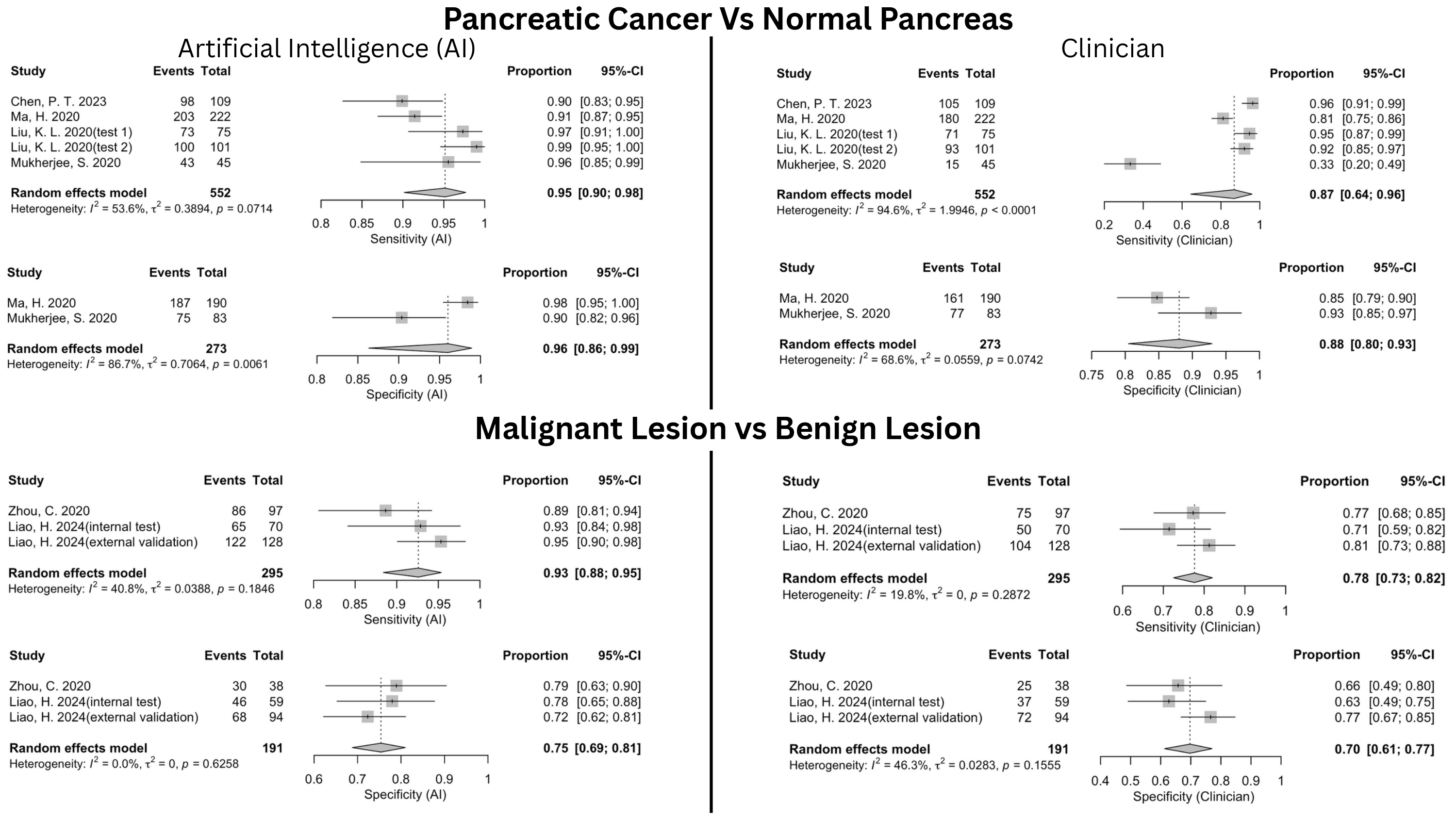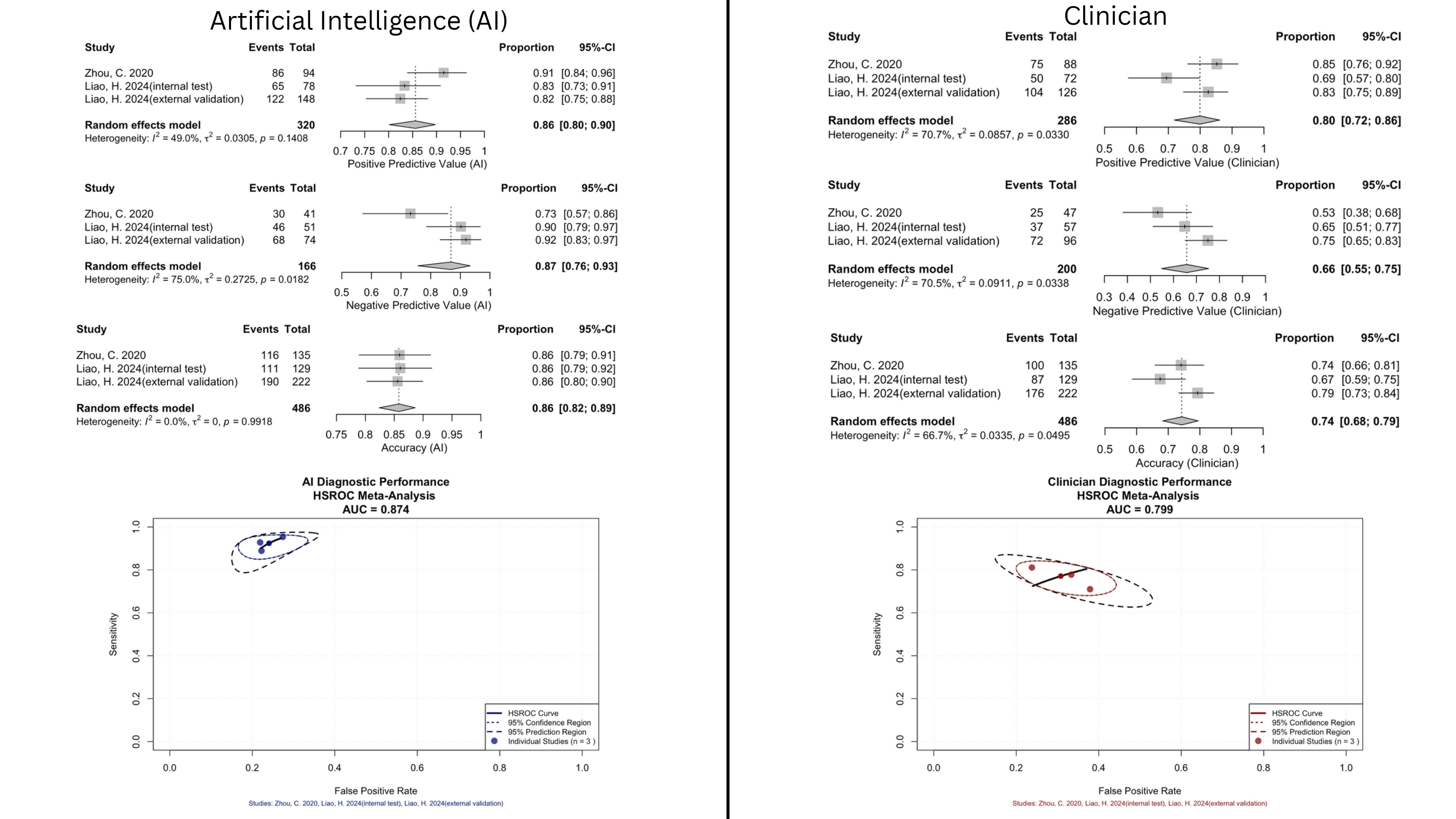Monday Poster Session
Category: Biliary/Pancreas
P2151 - A Systematic Review and Meta-Analysis of Artificial Intelligence Versus Clinicians for Pancreatic Cancer Diagnosis Using Computerized Tomography
Monday, October 27, 2025
10:30 AM - 4:00 PM PDT
Location: Exhibit Hall

Khutaija Noor, MBBS, FCR (she/her/hers)
Amicis Clinical Trials
Hyderabad, Telangana, India
Presenting Author(s)
Khutaija Noor, MBBS, FCR1, Jansi Sethuraj, BSN, RN, CCRN2, Suchith Boodegere Suresh, 3, Ramya Elangovan, 4, Sai Nikhitha Malapati, MBBS5, Kavin Elangovan, 4, Hemeesh Tandel, 6, Nancy Jayeshbhai. Vora, MD7, Elangovan Krishnan, MBBS, PhD, MS8
1Amicis Clinical Trials, Hyderabad, Telangana, India; 2University of Texas Health Science Center, Houston, TX; 3Montefiore St Luke's Cornwall Hospital, Newburgh, NY; 4AIM DOCTOR, Houston, TX; 5kamineni academy of medical sciences and research center, lb.nagar, hyderabad, india, Hyderabad, Telangana, India; 6C U Shah Medical College, Navsari, Gujarat, India; 7Grodno State Medical University, Grand Blanc, MI; 8AIM DOCTOR, Chennai, Tamil Nadu, India
Introduction: Pancreatic cancer, with its rising incidence and mortality imposes a profound clinical and economic burden. In the US, direct healthcare costs due to pancreatic cancer exceed $2.5 billion. Pancreatic cancer is often diagnosed at an advanced stage due to non-specific early symptoms, limiting curative options. Early detection dramatically improves survival, but fewer than 10% of cases are identified before metastasis. Artificial intelligence (AI) has emerged as a transformative tool in medical diagnostics, with advanced deep learning neural networks now capable of detecting subtle, early-stage pancreatic malignancies beyond human capabilities.
Methods: We performed a systematic review and meta-analysis comparing AI algorithms with clinicians for pancreatic cancer diagnosis using CT imaging. Databases including Ovid Medline, CENTRAL, Embase, Scopus, Web of Science, and IEEE Xplore were searched from inception to present. Studies directly comparing AI and clinician diagnostic performance were included. Three reviewers independently screened, extracted data, and assessed bias using QUADAS-2. Random-effects meta-analyses and HSROC models were conducted in R, following PRISMA-DTA guidelines.
Results: AI demonstrated superior diagnostic accuracy over clinicians in detecting pancreatic lesions. Pooled sensitivity and specificity for AI reached 95% and 96%, respectively, with lower inter-study heterogeneity compared to clinicians (sensitivity 87%, specificity 88%). In distinguishing malignant from benign pancreatic tumors, AI outperformed clinicians in sensitivity (93% vs 78%), specificity (75% vs 70%), positive predictive value (86% vs 80%), negative predictive value (87% vs 66%), and overall accuracy (86% vs 74%). HSROC analysis confirmed AI’s diagnostic superiority (AUC 0.874 vs 0.799), highlighting its potential to reduce diagnostic errors and minimize inter-observer variability.
Discussion: Our study affirms that AI-driven diagnostics consistently outperform clinicians in pancreatic cancer detection, echoing findings from recent experimental studies. AI integration reduces diagnostic variability, expedites workflows, and promises a paradigm shift in precision oncology. However, ethical considerations including transparency, bias mitigation, and data privacy remain critical for responsible implementation. Our findings provide robust, evidence-based guidance for clinicians and underscore the transformative potential of AI in pancreatic cancer care.

Figure: AI vs Clinician Diagnostics (1)

Figure: AI vs Clinician Diagnostics (2)
Disclosures:
Khutaija Noor indicated no relevant financial relationships.
Jansi Sethuraj indicated no relevant financial relationships.
Suchith Boodegere Suresh indicated no relevant financial relationships.
Ramya Elangovan indicated no relevant financial relationships.
Sai Nikhitha Malapati indicated no relevant financial relationships.
Kavin Elangovan indicated no relevant financial relationships.
Hemeesh Tandel indicated no relevant financial relationships.
Nancy Vora indicated no relevant financial relationships.
Elangovan Krishnan indicated no relevant financial relationships.
Khutaija Noor, MBBS, FCR1, Jansi Sethuraj, BSN, RN, CCRN2, Suchith Boodegere Suresh, 3, Ramya Elangovan, 4, Sai Nikhitha Malapati, MBBS5, Kavin Elangovan, 4, Hemeesh Tandel, 6, Nancy Jayeshbhai. Vora, MD7, Elangovan Krishnan, MBBS, PhD, MS8. P2151 - A Systematic Review and Meta-Analysis of Artificial Intelligence Versus Clinicians for Pancreatic Cancer Diagnosis Using Computerized Tomography, ACG 2025 Annual Scientific Meeting Abstracts. Phoenix, AZ: American College of Gastroenterology.
1Amicis Clinical Trials, Hyderabad, Telangana, India; 2University of Texas Health Science Center, Houston, TX; 3Montefiore St Luke's Cornwall Hospital, Newburgh, NY; 4AIM DOCTOR, Houston, TX; 5kamineni academy of medical sciences and research center, lb.nagar, hyderabad, india, Hyderabad, Telangana, India; 6C U Shah Medical College, Navsari, Gujarat, India; 7Grodno State Medical University, Grand Blanc, MI; 8AIM DOCTOR, Chennai, Tamil Nadu, India
Introduction: Pancreatic cancer, with its rising incidence and mortality imposes a profound clinical and economic burden. In the US, direct healthcare costs due to pancreatic cancer exceed $2.5 billion. Pancreatic cancer is often diagnosed at an advanced stage due to non-specific early symptoms, limiting curative options. Early detection dramatically improves survival, but fewer than 10% of cases are identified before metastasis. Artificial intelligence (AI) has emerged as a transformative tool in medical diagnostics, with advanced deep learning neural networks now capable of detecting subtle, early-stage pancreatic malignancies beyond human capabilities.
Methods: We performed a systematic review and meta-analysis comparing AI algorithms with clinicians for pancreatic cancer diagnosis using CT imaging. Databases including Ovid Medline, CENTRAL, Embase, Scopus, Web of Science, and IEEE Xplore were searched from inception to present. Studies directly comparing AI and clinician diagnostic performance were included. Three reviewers independently screened, extracted data, and assessed bias using QUADAS-2. Random-effects meta-analyses and HSROC models were conducted in R, following PRISMA-DTA guidelines.
Results: AI demonstrated superior diagnostic accuracy over clinicians in detecting pancreatic lesions. Pooled sensitivity and specificity for AI reached 95% and 96%, respectively, with lower inter-study heterogeneity compared to clinicians (sensitivity 87%, specificity 88%). In distinguishing malignant from benign pancreatic tumors, AI outperformed clinicians in sensitivity (93% vs 78%), specificity (75% vs 70%), positive predictive value (86% vs 80%), negative predictive value (87% vs 66%), and overall accuracy (86% vs 74%). HSROC analysis confirmed AI’s diagnostic superiority (AUC 0.874 vs 0.799), highlighting its potential to reduce diagnostic errors and minimize inter-observer variability.
Discussion: Our study affirms that AI-driven diagnostics consistently outperform clinicians in pancreatic cancer detection, echoing findings from recent experimental studies. AI integration reduces diagnostic variability, expedites workflows, and promises a paradigm shift in precision oncology. However, ethical considerations including transparency, bias mitigation, and data privacy remain critical for responsible implementation. Our findings provide robust, evidence-based guidance for clinicians and underscore the transformative potential of AI in pancreatic cancer care.

Figure: AI vs Clinician Diagnostics (1)

Figure: AI vs Clinician Diagnostics (2)
Disclosures:
Khutaija Noor indicated no relevant financial relationships.
Jansi Sethuraj indicated no relevant financial relationships.
Suchith Boodegere Suresh indicated no relevant financial relationships.
Ramya Elangovan indicated no relevant financial relationships.
Sai Nikhitha Malapati indicated no relevant financial relationships.
Kavin Elangovan indicated no relevant financial relationships.
Hemeesh Tandel indicated no relevant financial relationships.
Nancy Vora indicated no relevant financial relationships.
Elangovan Krishnan indicated no relevant financial relationships.
Khutaija Noor, MBBS, FCR1, Jansi Sethuraj, BSN, RN, CCRN2, Suchith Boodegere Suresh, 3, Ramya Elangovan, 4, Sai Nikhitha Malapati, MBBS5, Kavin Elangovan, 4, Hemeesh Tandel, 6, Nancy Jayeshbhai. Vora, MD7, Elangovan Krishnan, MBBS, PhD, MS8. P2151 - A Systematic Review and Meta-Analysis of Artificial Intelligence Versus Clinicians for Pancreatic Cancer Diagnosis Using Computerized Tomography, ACG 2025 Annual Scientific Meeting Abstracts. Phoenix, AZ: American College of Gastroenterology.

